In Memoriam: Carol Adele Kelly, 1931-2024
A Love of Words, Words, Word
Carol Adele Kelly, a founding member of the Shakespeareances.com team, died this morning in her Cincinnati, Ohio, residence. She was 94. Carol had been the copy editor for Shakespeareances.com since its inception in October 2011. My greatest challenge will be maintaining the quality she brought to every item I posted on this website, but I shall strive to do so as my ongoing tribute to her. My greatest loss, though, is her personality, puns, and unabashed love of life and living.
Upon learning of her prognosis in February, I visited Carol, after which I wrote this tribute to her. I wanted her to make sure she saw her Shakespeareances tribute before she passed.
Eric Minton
April 7, 2024
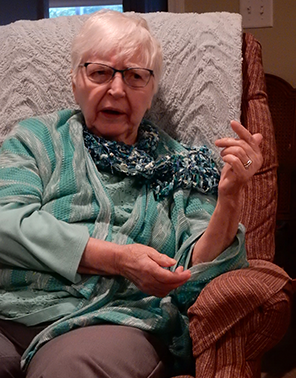
Carol Kelly, Shakespeareances.com's copy editor, sits in the basement apartment of her son's Cincinnati, Ohio, home in May 2018 when Sarah and I visited her while traveling for the Shakespeare Canon Project: 42 Plays, 42 Theaters, One Year. Photo by Eric Minton
The great influencers in my life start with my mother and father, who shaped my person with their genes and my approach to living with their values; Jesus Christ and Martin Luther King Jr., who laid out my spiritual track and taught me how to treat all people with respect, dignity, and love; Sarah Smith, my wife, who encouraged me to have faith in myself, inspired me to live a life of passion and passions, and gave me front-row-seat lessons in management, leadership, dedication to service, and courage; John, my brother and lifelong best friend, who established my standard for fatherhood; William Shakespeare, Mark Twain, and Bernie Taupin, who showed me what great writing is; Dr. Don Ranly, my magazine editing and semantics professor at the University of Missouri, and David Pasztor, my fellow editor on the university's student newspaper, exemplifying the high standards of journalism excellence I uphold; Carol Kelly, who is the subject of this tribute; and Mork, who is the reason for this tribute.
From its inception in 2011, Shakespeareances.com was a three-person operation. Sarah helped with management and technical matters, read everything I posted through 2018, and even wrote one play review. Alzheimer's has since diminished her ability to contribute beyond ongoing encouragement to keep going. Carol Kelly has been my copy editor. Up through last summer she edited every item on this website before and after I posted them. Ironically, in her family's lore, I'm the guy who "tried to ax her."
Carol's last contribution to Shakespeareances.com was my account of A Midsummer Night's Dream on Rockaway Beach in New York last August. Carol is 94 years old and was living in a lovely basement apartment in the Cincinnati home of her son, Matt, his wife Julie, and their three children. In October, Carol fell in her apartment. She was backing up with her walker and not wearing her fall alarm when she tripped, fell, and broke her foot. By her account, it took her two hours to crawl across two rooms to get to the alarm, but she doesn't remember reaching it and doesn't know how Matt and Julie found her. Matt says she did signal, and when he reached her and saw how far she had crawled, he doesn't know how she did it.
"My aide told me over and over to never walk backward and to always wear my alarm, and here I am," Carol told me two weeks ago with more than a touch of self-adomishment in her expression. "Here" is the nursing home that has been her residence since October when doctors determined they could not mend the break and get her walking again. She wishes she could still live at home—and die at home.
On New Year's Day, I got word from the family that Carol was declining. Of course, I needed to visit her, and Sarah confirmed that notion though her own decline was becoming acute. I asked Matt to give me his perspective on the sooner-or-later spectrum, and he mentioned the family making big plans for Carol's 95th birthday in April as a benchmark. I wasn't comfortable waiting that long, and with the Cincinnati Shakespeare Company opening a new production of Julius Caesar on March 1, I decided to combine that with seeing Carol. Matt offered me her apartment for my lodging.
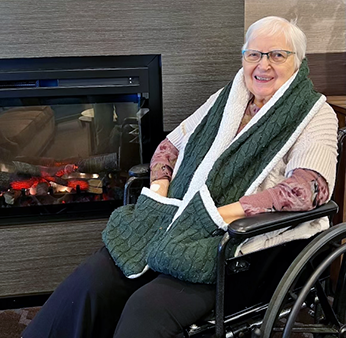
Carol Kelly sits in the lobby of her nursing home on February 4, two days after learning she'd been diagnosed with stage three gall bladder cancer. "You'd never know," Matt texted with the photo. "She is in great spirits and still sharp as a tack!" Photo courtesy of Matt Kelly.
On February 3, Matt called. The day before, his mother had been diagnosed with stage three gall bladder cancer. I could hear in his voice that the sooner-or-later spectrum had tilted toward soonest. "I'll be there on Wednesday," I told him.
After getting Sarah out of bed and dressed the morning of February 7, I made the eight-hour drive north. The next day, my arrival at the nursing home was a complete surprise for Carol. "I thought the padre was coming," she said. "I'm the padre's son," I replied, referring to my father being an Air Force chaplain, a joke she got immediately. I then revealed a tub of five different batches of cookies I had baked over the three previous days. She raves about my cookies, which I've been sending her every Christmas for at least 15 years. That I didn't hear a response from her this past Christmas alerted me that something was wrong and prompted my inquiry to the family. Carol did receive them; she just didn't have the means to email me a rave. I spent the full day with her and left Matt's home predawn that Friday to get back to Sarah in time for her dinner and bedtime.
It was my privilege and duty to make that trip. With Carol's daughter, Maria, joining us in the afternoon, my day with Carol capsulized the special relationship we have. We ignited our senses of humor. We reminisced over our experiences of challenging articles and deadlines. We recalled our journey getting her book, Voices of My Comrades, a collection of World War II veterans' first-hand accounts, published by Fordham University Press in 2007 (click here for purchase information). We talked Shakespeareances. By editing my reviews, commentaries, and news items, Carol vicariously shared in the adventures Sarah and I lived, and I took her to The Comedy of Errors at Cincinnati Shakespeare Company in 2014. I shared in her family dynamics, her personality mirrored in her six children and their significant others. Carol is an outstanding grammarian, a good comrade, a special mother, a loved grandmother. Her dedication to her craft, to her family, friends, and associates, and to carrying out her assigned tasks to the highest possible standards of quality have been a constant inspiration for me. It is my privilege and obligation to write this tribute.
Carol Adele Consavage was born April 13, 1931, on Magazine Street in Carnegie, Pennsylvania, a birthplace she believes destined her life. "My DNA was encoded with its love of books, my passion for reading, and my devotion to writing," she wrote in her Shakespeareances.com bio. Her favorite childhood memory was the day she got her own library card at the Andrew Carnegie Free Library. Here grandparents immigrated from Lithuania and impressed their native culture on Carol. "I have waved the Lithuanian flag all my life," she says, and she has. I've garnered Lithuanian phrases, travel tips, and recipes from our relationship.
Her journalism career began as a reporter and feature writer for the Carnegie weekly newspaper when she was still in high school. She covered school board and council meetings and her features included a profile on her father's hometown hero, baseball Hall of Famer Honus Wagner. She worked for her hometown newspaper while attending the University of Pittsburgh, where she earned her bachelor of arts degree in journalism. She served as editor of two suburban Pittsburgh weekly newspapers before working as feature editor and wire service correspondent for the Pittsburgh Catholic newspaper. One day at the university's library, fellow student Norm Burzynski, who was a photography enthusiast, took a picture of Carol. This led to a close friendship with Burzynski and his wife, a connection that would have significant impact on both Carol and me.
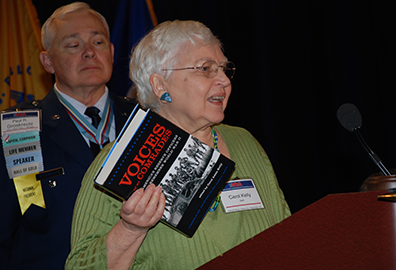
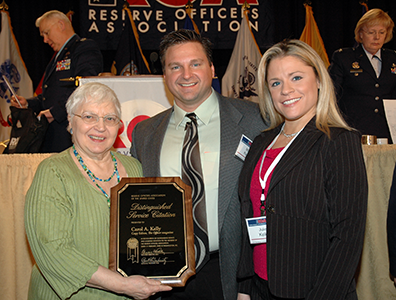
Top, Carol Kelly thanks the ROA and World War II veterans after ROA President Colonel Paul Groskreutz, USAF Retired, presented her the association's Distinguished Service Citation in 2008. Above, Carol holds the award as she poses with her son, Matt, and his wife, Julie. Photos by Eric Minton.
Upon marrying Richard M. Kelly, Carol became a stay-at-home mother, but launched a freelance career when the youngest of her six children entered high school. She was a ghostwriter for a businessman, editor for Disabilities Digest and a monthly suburban newspaper, and for 10 years edited prayer books and liturgical texts by the French Bible scholar and composer, the Rev. Lucien Deiss. In 1984, Burzynski, who was then editor of The Officer magazine published by the Reserve Officers Association (ROA) in Washington, D.C., called on Carol, living in Cincinnati, to freelance for him as a copy editor and project officer. From her home she managed a major undertaking for the magazine, collecting and editing the memoirs of reservists who served in World War II. These were published as a five-year series of articles commemorating the 50th anniversary of the war. After Burzynski retired, he left in his wake a legendary standard for the magazine and Carol, who would continue her editing association with ROA for a total of 37 years, missing just one published edition.
That edition was the 2005 year-ending issue of The Officer after her husband died of a heart attack over Thanksgiving weekend. After a period of grieving, Carol intended to return to her duties, which, under the editors who succeeded Burzynski, had become marking up all the stories with "suggested edits" that then would circulate back through the staff and writers for approval. But on January 2, a new editor took over the magazine, one charged with raising the magazine's quality while improving efficiency and reining in a runaway budget. That editor immediately saw an easy target for improving efficiency: the "old lady in Cincinnati" as a member of the ROA staff referred to Carol. A proper magazine needed a real copy editor, not one who did "suggested edits," and based on the mistake-filled edition of the magazine the new editor inherited, dropping Carol would improve quality as well as efficiency. It wouldn't help the budget much, though; Carol was being paid only $100 per issue (10 per year).
The new editor, however, was a coward and waited until the last minute, on the eve of production for the next edition, before calling Carol to terminate her. "I've been waiting to hear from you," she said matter-of-factly when I identified myself. We spoke for 90 minutes as I took in her institutional knowledge (better than I was garnering from the rest of the ROA staff), her obvious language skills, and her fun personality. I didn't get around to terminating her, but at the end of the call with my intention still intact, I stalled, telling her only that I was working on a new production process and would let her know by the end of the week. Yep, I left her hanging. But not for long. I had already scanned through a years' worth of The Officer to see what topics were covered; but now I went back through them reading several stories. The copy was solid, especially the grammar; the only exception was the most recent issue—the one Carol didn't work on.
The first thing I did after arriving at my office the next morning was email Carol my decision. She was no longer going to do suggested edits: she was going to do final edits, as a copy editor is supposed to do, including on my articles. She would also proof the pages. In that fell swoop I improved quality and efficiency tenfold, not to mention begin an 18-year professional and personal relationship with Carol. I couldn't yet alter what ROA was paying her—and she hinted she would work for free—until the summer when the Air Force transferred Sarah from the Pentagon to Hill Air Force Base, Utah. My status with ROA changed from employee to contractor running a turnkey operation producing the magazine: ROA paid me an established fee out of which I covered all my operational costs, including salaries. I upped Carol's pay to $500 per month, though we were still producing just 10 issues. That's a 600 percent increase in her annual ROA pay and what I determined to be her position's market value. Still, she was a bargain. The value of her skills and dedication is evident in her record of longevity, whether with editors or priests.
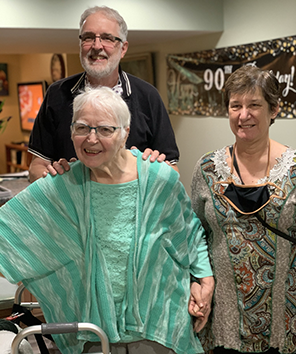
The Shakespeareances.com team: Carol Kelly, my wife, Sarah, right, and me in back on our May 2018 visit a month after the family celebrated Carol's 90th birthday. Photo courtesy of Matt Kelly.
It wasn't a one-way relationship, by any means. I championed her 10-year efforts to get her World War II series published in a book, establishing a financial partnership between ROA and Fordham University Press. Then I helped her with narrative editing and whittling the manuscript's length—at no charge (I add that only for the necessity of full disclosure: it was a given from my point of view). I'm proud to be listed among her thankyous in the book alongside Norm Burzinski, whose legacy at ROA was a guiding light for me.
Becoming my father's primary caretaker after his stroke in 2010, I left ROA, but was brought back three times to serve as interim editor. Carol was still part of the team the first two times I returned (she outlasted more editors than I can count). For my third interim stint, two years after ROA had ceased publishing The Officer, I established a new semiannual magazine for ROA. Carol was the first person I selected for yet another impossible mission team.
When I launched Shakespeareances.com, I wanted to ensure the site's quality met my own high journalism standards in all aspects, from accurate reporting to clean copy. That automatically meant turning to Carol. In asking her, I was clear that this is a not-for-income project and I wouldn't be able to pay her at all. She didn't want the pay: she wanted the experience. Note, this is not career experience but the experience of living life to its fullest joys, and I shared in that experience through every email, phone call, and visit I've had with her. That attitude even characterized her editing notes: I've never enjoyed seeing my mistakes being corrected—especially my primary vice, misplaced and dangling modifiers—as much as when Carol does it with a hint of scolding.
I didn't watch but a few snatches of the 1970s TV series Mork and Mindy with Robin Williams and Pam Dawber in the title roles, but one of those snatches was the final segment of one episode. Each episode ended with Mork, an alien sent to earth to study human behavior, reporting back to his superiors on the planet Ork. In the one I saw, Mork commented on how humans use flowers to show appreciation to someone they love. But, he wondered, why do they send flowers after the person has died? "Shouldn't they do it before they die?" That has stayed with me, governing my approach to appreciating important relationships, be they romantic, friendship, or collegial. Someday too soon—too soon even if Carol lives past 100—this "Tribute" will be re-labeled as an "In Memoriam," but this way I'm certain Carol will receive this expression of my appreciation and affection for her person and her work.
Our appreciation. All of the Shakespeareances community owes Carol Kelly a sincere thank you. I owe her that and much, much more.
Eric Minton
February 22, 2024


